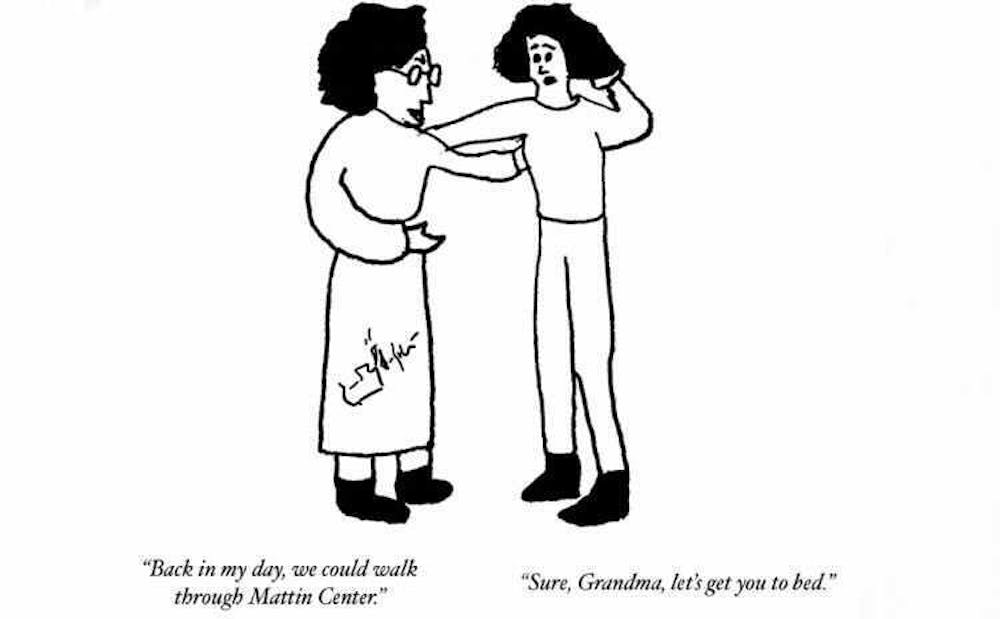It truly was another unprecedented summer. As vaccines became more readily available and COVID-19 cases in Baltimore declined this past June, Hopkins relaxed its indoor mask mandate and weekly testing policies. Many students felt optimistic that the fall would represent as close a return to normal as possible.
The second half of this idealized “shot girl summer” presented a reality check. With a rise in cases associated with the delta variant, Hopkins reinstated indoor masking. Just this week, the University reversed course and told fully vaccinated students living off-campus that they would need to be tested once a week.
With so much change, is the phrase “So good to be back” a statement of truth, or one of sarcasm? Though the blue and green interior is familiar, Brody feels more like a Zoom cafe than a hangout spot. Freshmen still look to meal times as opportunities to socialize, but they now eat outside together to avoid the socially-distanced seating in the Fresh Food Cafe and Levering Kitchens.
Some in the Hopkins community are concerned we won’t be “back” for very long. There seems to be widespread understanding that the limited in-person privileges we have now stand on shaky ground. Irrespective of the high vaccination rate in the Hopkins community, few have ruled out the possibility of a shift back to online classes, or worse.
This is exacerbated by the possibility of breakthrough cases, an issue present for both students and faculty. As a leading public health institution, Hopkins must set clear, standardized guidelines for how it will respond to worst-case scenarios this semester.
The University’s published student illness policy, for example, states that excusing absences is a matter of professorial discretion, on a case by case basis. Students who test positive are expected to quarantine, but this is more difficult now that many classes lack online options. According to the University, the Student Health and Wellness Center (SHWC) will provide students whose visit causes them to miss class with verification of their visit. Will professors excuse absences for students with symptoms who do not visit SHWC? Will students in quarantine be excused and provided with virtual coursework options?
Fortunately, some faculty have already included plans in their syllabi to accommodate students, and discouraged those who feel ill from coming to class; others are opting to hold office hours virtually. We know our instructors are concerned about their own health too, and we are grateful they are being flexible during times of uncertainty.
We appreciate the reverence Hopkins affords evidence-based decision making; in the past 18 months, University guidance has generally fallen in line with the Centers for Disease Control and Prevention’s recommendations.
Except, of course, when it hasn’t.
Mere weeks before students returned to Homewood Campus, the University reversed its decision to accept vaccines approved by only the World Health Organization, which many international students received. Freshman move-in was scheduled to begin two days following the announcement. As a result, some new students weren't given the option to express concerns prior to being revaccinated during their housing check-in.
Hopkins itself recognizes the lack of controlled studies on revaccination, yet fails to acknowledge and properly respond to the worries of their students. Of course, we appreciate the University approaching public health cautiously; however, we understand why international students are concerned about the unknowns surrounding revaccination.
Alongside changing COVID-19 protocols and readjustment, the state of our physical campus is contributing to stress.
Although “open” in status, the facilities available at the Ralph S. O’Connor Recreation Center are severely limited for the time being. Despite previous projections for the renovation to have been completed by August, we have yet to find out when exactly we will get full access.
While the demolition of the Mattin Center will ultimately benefit future Blue Jays, it hinders campus accessibility for present-day students. With construction blocking the multiple paths through this area, students, particularly those living below 33rd Street, now have to account for extra travel time. More importantly, the construction removes accessibility points for students, faculty and staff who use wheelchairs or have other mobility issues, further limiting their ability to travel around an already inaccessible campus.
Some students and faculty members have experienced issues attending or conducting class, with mass wifi outages on and around campus this week. The University has a responsibility to ensure reliable wifi connectivity so that classes, both online and in-person, can occur in the first place.
As students, we get it. We’re all still adjusting to commute times, actually wearing pants and reckoning with our unconventional college experience. We hope Hopkins too will adjust to meet us where we’re at.
Because Hopkins invited all students back in person, it has an obligation to create a campus that is comfortable and accommodating for all.





